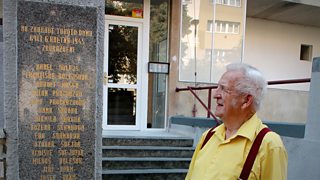
Ceslav Roubicek, who fought in the Prague Uprising, standing next to a plaque commemorating some of those who died in the area where he fought in 1945. Ceslav joined in the uprising after hearing a call for help from the radio station.
I met Dusan Masic at Broadcasting House. It was the first interview for , my first radio documentary.
Dusan was one of the founding members of the Serbian station , which throughout the 1990s grew from a student collective with shows intended to ‘insult any listeners who called in’, into a serious opposition force to the Milosevic regime.
Whilst my worst experience with student radio was trying to stop pirates blocking our signal, B92 were shut down four times by the government in an attempt to stop their message reaching the people of Belgrade.
Each time the station struck back, finding new premises, new equipment and new ways of getting their message out. On one occasion, Dusan hung out of a window and read the news to thousands of protesters who gathered outside, angered by the station’s closure. Over time the actions of Dusan and his colleagues fuelled the opposition movement which toppled the Serbian dictator.
Radio’s unique, personal connection with its listeners, coupled with its cheapness and ease of use means that Dusan’s story is by no means unique. Across radio’s 90 year history, from Prague to Egypt, radio has played a key role in many pivotal political moments.
In the 1980s one Nicaraguan General even suggested it was more dangerous to give people microphones than guns; at least he knew how they’d use the weapons.
I’d pitched this idea of a documentary celebrating radio’s revolutionary voice at a training event a few months earlier in a rather unusual way.
While most radio pitches are written down and emailed from person to person, I had to communicate mine face-to-face with Tony Philips, the first commissioner I would ever meet, in a room full of radio professionals.
In the course of making the documentary I spoke to a huge number of people who had been on the frontline of radio.
Some, like Edwin Frank, the voice of Radio Free Grenada, were now embarrassed by their youthful enthusiasm for a cause.
This clip, featuring Edwin Frank, is a story about the 1979 Grenadian revolution where the 'New Jewel Movement' revolutionaries took over the radio station to announce the revolution.
Edwin Frank and Lew Smith who both worked at 'Radio Free Grenada'.
But others, like Professor Antonia Moropoulou, who was imprisoned by the ruling military junta in Greece after she broadcast student demands to the people of Athens from a home-made radio station, were still fighting.
However, taking the tube home after my interview with Dusan, I couldn’t help reflecting that whilst I was taking my first tentative steps into the world of documentary making, I’ll never make the same impact with my radio broadcasts as my interviewees.
Nevertheless I’m excited by the idea that I’m becoming part of a medium which can be a voice in the dark or even a spark of rebellion to so many people.
Revolutionary Radio can be heard on the , with a shortened version .
